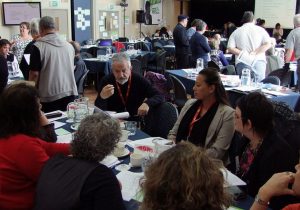Community based education promoting settlement outcomes
Adult and community education is an important pathway for newly arrived migrants and refugees starting their lives in Australia, a major conference has heard.
Adult and community education (ACE) provides benefits to people from diverse backgrounds through foundation skills such as English language and literacy but also through building connections into the wider community as well as confidence, the ‘No Frills’ National VET Research Conference heard.
Researchers Anne Walstab and Esther Doecke, from Victoria University, told the conference ACE participants and learners saw social, educational, economic and additional other benefits.
 They said that 36 per cent of ACE participants were from non-English speaking backgrounds and that their courses played an important role in their settlement journeys.
They said that 36 per cent of ACE participants were from non-English speaking backgrounds and that their courses played an important role in their settlement journeys.
“The foundation skills, such as English language and literacy courses are obviously important. But we find individuals participating in ACE build connections, skills and confidence,” said Senior Research Fellow Ms Walstab.
“This leads on to people making friends and finding work,” she said.
“This is a positive when considered from the perspective of the individual learner, the community and the nation as a whole.”
She said there was also strong evidence from the UK that the ACE sector promoted social cohesion.
The researchers said that learners undertaking foundation skills training in ACE typically face various forms of educational, social and economic disadvantage.
This may include a lack of formal qualifications, experience of long-term unemployment, or for those in the workplace, risk of job loss, they said.
“As communities recover from the COVID-19 pandemic, there is an even greater impetus for low skilled adults to further develop their foundation skills to secure new and ongoing work,” the researchers said.
“Moreover, the importance of rebuilding social connections following periods of isolation during COVID-19 restrictions in different jurisdictions is also a crucial part of recovery for individuals and the wider community.
“These social or non-marketised benefits are more difficult to quantify than other benefits and gaps in the literature are most notable across this domain, as they reach beyond traditional measures of educational and employment attainment, progression or transition, to include increased social engagement, capacity to participate in the community, improved personal skills and digital inclusion.
The conference was hosted by the National Centre for Vocational Education Research (NCVER) and RMIT University.












